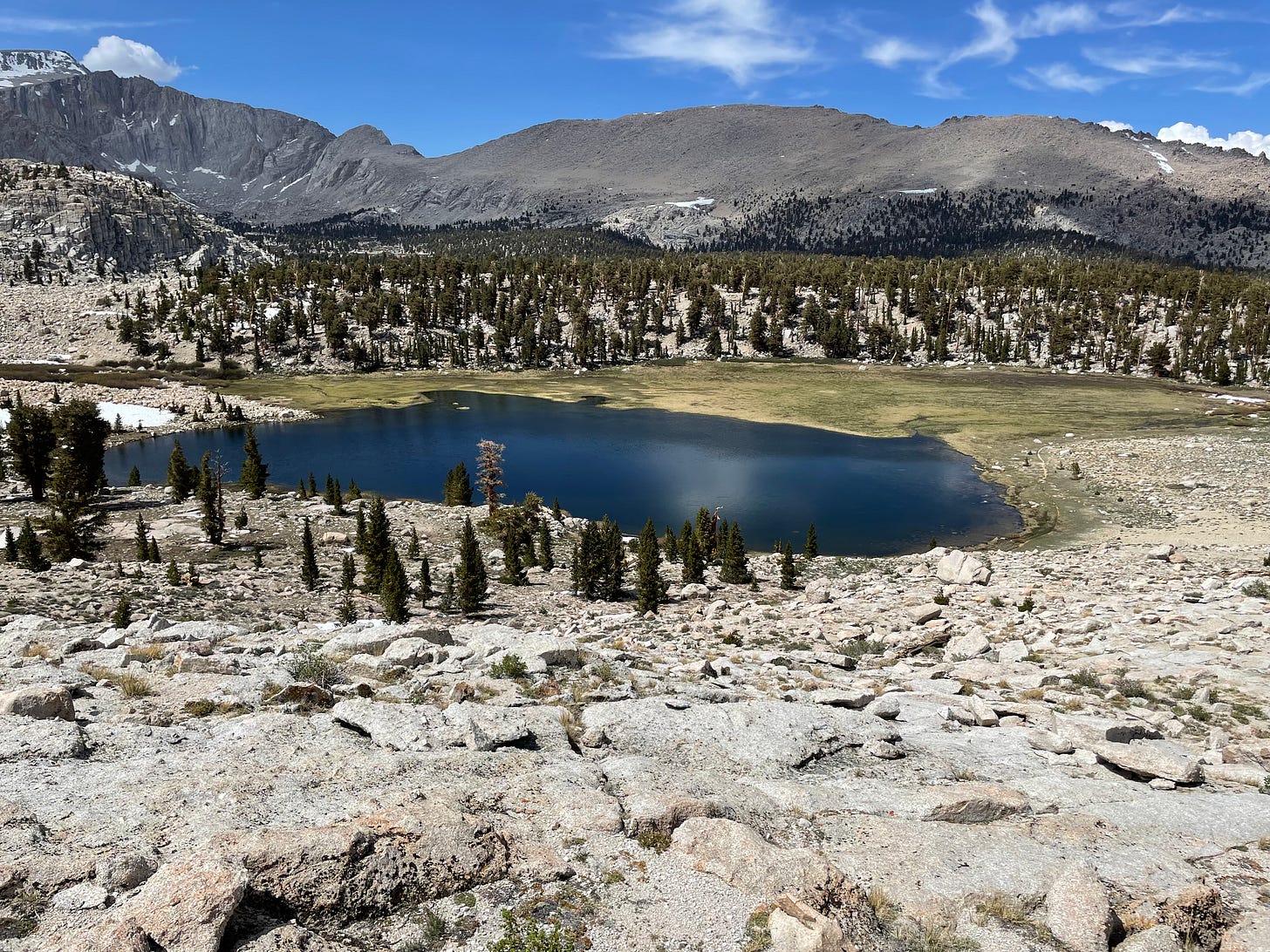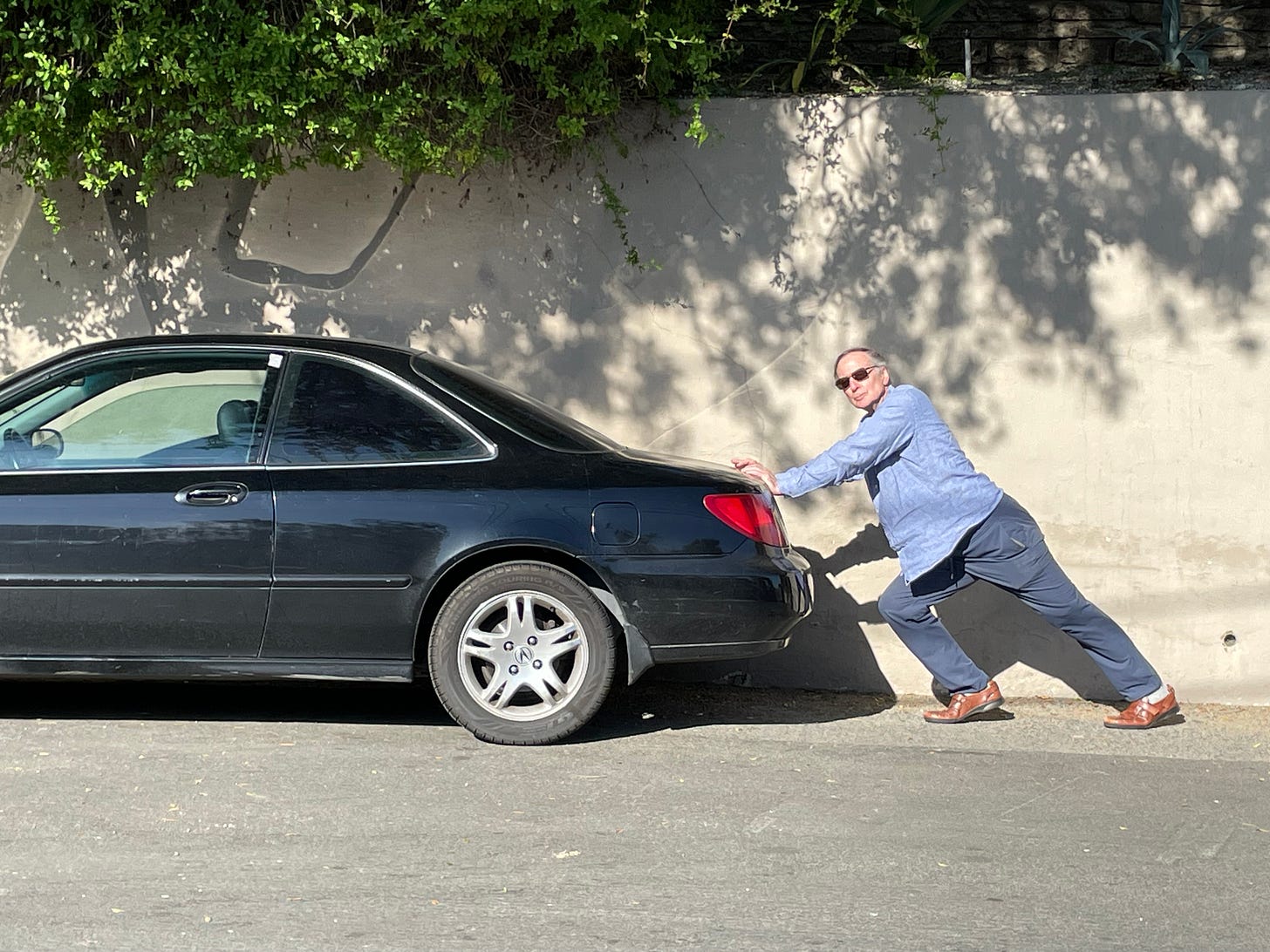If you happen to have read two of my recent posts on Fire Philosophy—
1. From Driverless Cars to Driverless Persons—a Eulogy and
2. Dealing with Trouble
—you are in excellent position to appreciate some delicious irony. The first of these posts was an advance eulogy for the automobile that had escorted me through the world for the last quarter century, a brief essay that was actually a covert way to address the AI/robotics destruction of the role of skill development in human life. And the second was a set of reflections on how we can deal with the continual flood of trouble in life.
The irony, descending upon me like a bolt of mountain lightning, is that my car did die and that what its death showed about my own skill in dealing with trouble is that I may not have any. Here are a few details.
In early June I had the privilege of spending a week in the high Sierras with a good friend. We backpacked into the Cottonwood basin of the Eastern Sierra and from a basecamp established there, hiked for many miles each day to crystal clear lakes at or above the 11,000 foot tree line. It was spectacular, or beyond that, even magical. But that’s another story.
After that week of inner and outer transcendence, we each drove down the mountain and away in opposite directions. My route took me across many miles of California desert, and as I had done dozens of times in the past, I drove blissfully along at high speeds with the AC blasting to withstand the assault of 100 degree weather. My spirit remained high on mountain peaks; I was immortal.
Wrong. The initial evidence of my skill-lessness in the arena of “trouble” is that I failed to watch the car’s temperature gauge. In fact, I never saw it at all before feeling my car sputter and die. I rolled to the cactus strewn side of the road and quickly realized the trouble that my cluelessness had caused.
Evaluating my resources for escape from trouble, I realized that (1) I had less than 10 ounces of drinking water in the car and (2) the battery bar on my cell phone looked more like a spec than a bar. While there were occasional cars passing at high speeds, it was obvious that my post-camping hygiene level and disheveled attire would not inspire volunteers for assistance. The only thing that can be said in defense of my “Dealing with Trouble” essay is that it addressed what to do when trouble falls upon you, no matter who’s fault that may have been. It didn’t address how to stave off avoidable trouble in the first place. But that’s clearly the kind of wisdom I lacked.
Lesson #1: if you have an old car and are driving in extremely hot weather conditions, slow down and watch the temperature gauge.
Lesson #2: if you’re traveling over long stretches of 100 degree desert, be sure you have plenty of water.
And #3: especially if you’re an elder driving an elderly car, be sure your phone is fully charged.
Failure on all three accounts, none of which would qualify as particularly advanced forms of wisdom. A precocious 12 year old could have dropped these suggestions on me.
Although the fact that I’m writing this gives evidence that I survived the ordeal, here is how the story unfolded in case you’re curious. The single spec of phone capacity was enough to contact AAA. Even though I couldn’t tell them exactly where I was except “somewhere out on southbound highway 395,” they promised a tow truck within an hour. “An hour?” Yes, what did you expect when you’re out in the middle of the desert? I sat in the oven of my black automobile and was approaching “well-done” when a truck arrived about 45 minutes later. I was towed 15 miles to the small desert city of Ridgecrest, a town supporting the Naval Weapons Depot that experiments with all kinds of explosive devices out in the desert. The auto mechanic to which I was towed pronounced my car dead on arrival. “Of course you can repair it,” I was told, “but at an expense that only a fool would accept.” Emotionally attached to my car, yes, but foolish enough to empty my savings account on its behalf? Perhaps not. I traded my car to the mechanic in exchange for whatever disposal expenses he would incur to handle it from there.
Problem solved, except that I was now carless and still 3 hours from home in a city without buses or other transportation options. Asking for advice, I got shoulder shrugs. Surveying the town, I checked into a small motel to gather whatever wits I had left. The kind motel manager called her friends to see who might be willing to drive me to LA for an appropriate fee. The only volunteer said that while she was eager to help, she wasn’t sure her car could make it to LA. I envisioned the two of us again stranded in the desert. The single taxi in town could only drive me halfway. A navy sailor said he might be able to drive me, but he wouldn’t be going into LA until next Tuesday. Then finally, after multiple tries, an Uber driver agreed to make the trip—for an undisclosed but surely substantial fee. I was desperate and extremely happy to arrive home the next day.
I was relieved but humiliated by the fact that I had hastened the demise of my car. Rather than let it die a natural death, a court of law would have affirmed at least a charge of “carslaughter.” I survived, but with me at the wheel, it would not. Can you imagine anyone foolish enough to write about “how to deal with trouble in life” while being unable to demonstrate basic common sense in concrete, real-life situations? Guilty as charged by the sheer facts of life! Life can be cruel. I can be stupid. It’s humiliating. I may need to live another century or so just to master a few basic points of wisdom. We’ll see how that goes.






Dale, I'm just catching up on Substack. Great story, shows that all of us are subject to Nirvana, your time in the mountains, and Dukkha, your time in the desert. Glad you're back with your usual balanced (the Middle Way?) approach to life.---Joel